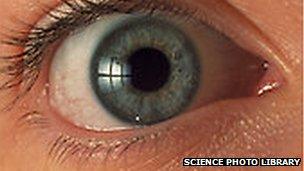NHS faces judicial review from Novartis over Avastin
- Published

The pharmaceutical company Novartis is challenging the use of a cheaper alternative to its drug Lucentis for a common cause of loss of vision.
The NHS in four areas in the south of England agreed last year that a drug called Avastin could be prescribed for the condition wet AMD.
Lucentis is recommended for use by the NHS drugs watchdog NICE.
Avastin, made by Roche, is not officially approved for eye conditions, but is being widely used off licence.
Severe loss of vision
Wet age-related macular degeneration, or AMD, is a common cause of loss of vision in older people.
According to the NHS, around 70% of people with wet AMD will experience severe loss of sight within two years of being diagnosed.
Lucentis, which costs about £740 per injection, is the treatment officially recommended to the NHS in England by the independent advisor NICE.
It was developed for use in eye conditions and has been given a European licence, or safety approval, for treating wet AMD.
The NHS in Southampton, Hampshire, The Isle of Wight and Portsmouth decided last year that it would also pay for the use of Avastin, where it was prescribed by an ophthamologist.
Avastin costs around £60 per injection, and has to be used off licence as it has not been formally approved for use in eyes.
'Safety at risk'
Novartis, which makes Lucentis, is seeking a judicial review of the policy to pay for Avastin on the NHS.
The company argues that systems put in place to safeguard patients are being undermined.
Novartis said: "It is unacceptable to put the safety of patients at risk through the widespread use of an unlicensed treatment when a licensed medicine is available.
"It undermines the regulatory process that was introduced to safeguard patients."
But the four primary care trusts, now working together, which agreed to fund Avastin say it is offered as an extra option for clinicians. They will still pay for the more expensive Lucentis when it's prescribed.
The PCTs say the cheaper alternative is safe and useful.
"Avastin is internationally recognised as an effective treatment for AMD, and for example over 50% of AMD patients in the United States are treated with Avastin."
'Greater clarity needed'
Behind the legal case is a dilemma for the health service. Using a cheaper drug that seems to work well, even if it is not licensed for this condition, saves money.
However, it could also create a disincentive for the pharmaceutical industry to develop expensive new treatments.
The Macular Disease Society says there needs to be greater clarity. It is worried that as off licence use of Avastin has increased in the NHS, patients are sometimes being asked to decide which drug to try.
Spokesperson Cathy Yelf said: "If Avastin is not as safe as Lucentis, no-one should be using it. If it is as good, then perhaps everyone should be using it. "
But Prof John Harris, of the Insitute for Science Ethics and Innovation at the University of Manchester, said: "Companies like Novartis should not be in the position to block moves to more cost-effective treatments in order to maximise their profits."
There are some research studies under way to compare the two drugs, but NICE is unable to review Avastin for eye disease as it has not been officially approved for that use.
- Published16 March 2011
- Published11 June 2010